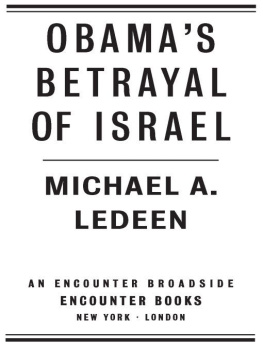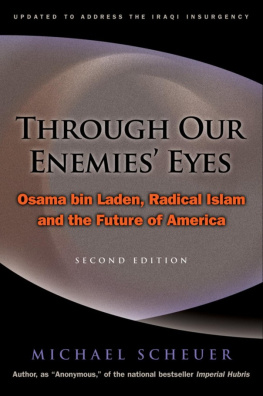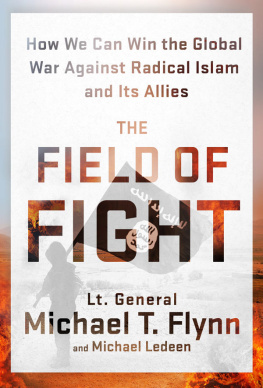Guide to
Michael T. Flynns & et al
The Field of Fight
How We Can Win the Global War Against Radical Islam and its Allies
by
Instaread
Please Note
This is a companion to the original book.
Copyright 2016 by Instaread. All rights reserved worldwide. No part of this publication may be reproduced or transmitted in any form without the prior written consent of the publisher.
Limit of Liability/Disclaimer of Warranty: The publisher and author make no representations or warranties with respect to the accuracy or completeness of these contents and disclaim all warranties such as warranties of fitness for a particular purpose. The author or publisher is not liable for any damages whatsoever. The fact that an individual or organization is referred to in this document as a citation or source of information does not imply that the author or publisher endorses the information that the individual or organization provided. This concise companion is unofficial and is not authorized, approved, licensed, or endorsed by the original books author or publisher.
Table of Contents
Overview
Field of Fight:How We Can Win the Global War Against Radical Islam and its Allies presents Lieutenant General Michael T. Flynns assessment of where the United States is failing in its fight against extremism and offers a strategic formula for how to proceed in the future. After decades of serving his country in both Iraq and Afghanistan, Flynn has developed an experts perspective on what he perceives to be the governments failures. He offers several solutions for how to prevent radical Islam from forever taking hold around the world.
Time and again, the United States has not prepared adequately for conflict and war. In times of relative stability and peace, American leaders often fail to drill down on policy and strategy to develop innovative ways to combat emerging enemies. The prominence of radical Islam and its fight against Western values is a testament to the fact that the United States and its allies have underestimated this entity. For years, the United States has assumed that a large army more equipped to fighting on the open battlefields of World War II would be sufficient for crushing the grassroots insurgents who have arisen across the Middle East and Afghanistaneven after experiencing a humiliating defeat to a similar guerrilla force in Vietnam. However, with the rise of the Islamic State in Iraq and Syria (ISIS) and the inability to restore peace and order in both Iraq and Afghanistan, its become patently clear that the Islamic extremists are a force to be reckoned with and should never be underestimated.
Every war has both a battlefield component and a war of words and beliefs. In the United States, political correctness has kept many leaders from calling this global terrorist force what it is: radical Islam. The refusal to label or acknowledge the ideological link between radical Islamist extremist groups has made it virtually impossible to fight terrorism on a logical level by reminding the public of the hatred behind much of the radicals rhetoric. Without this weapon of discourse, the West is unable to effectively sway public opinion against radical Islam and secure the publics support in the fight against enemies of the West.
Important People
Michael T. Flynn is the author of Field of Fight:How We Can Win the Global War Against Radical Islam and its Allies. He is a retired US Army lieutenant general and was the director of the Defense Intelligence Agency from 2012 to 2014.
Michael Ledeen is the co-author of Field of Fight and is also the author of several books about Iran, terrorism, and US foreign policy. He has acted as consultant to several top government agencies including the State Department and the National Security Council.
Stanley McChrystal is the now-retired US Army general who was the commander of the International Security Assistance Force (ISAF) and worked closely with Flynn in Afghanistan.
Key Insights
- Radical Islam is an international threat that must be taken seriously in order to defeat it.
- The US government repeatedly neglects to prepare for the next, inevitable conflict during times of peace.
- The United States and its Western allies are losing their global battle against radical Islam.
- Adherence to political correctness causes major world leaders to avoid the term radical Islam, thereby undermining the publics ability to understand and define the enemy.
- Even after a humiliating defeat in Vietnam, the United States did not update its military strategy to focus on defeating guerrilla forces.
- In the intelligence community, many officers have a fear of delivering the truth up the ranks, which promotes a dangerous lack of truth and transparency.
- Excessive bureaucracy can severely inhibit intelligence-driven warfare.
- Iran has been a threat to the United States for decades through its sponsorship of international terrorism. However, the United States has prioritized maintaining diplomatic relations with Iran over international security.
Analysis
Key Insight 1
Radical Islam is an international threat that must be taken seriously in order to defeat it.
Analysis
The United States has been routinely unprepared to handle the threat of radical Islam. The United States and its allies are misinformed about this enemy and have underestimated its capabilities. Radical Islamists are often mischaracterized as less capable and intelligent than the US armed forces. However, these militants are very sophisticated in their intelligence-gathering methods and are highly skilled in planning and coordinating attacks. Underestimating their abilities puts US citizens and interests at risk.
Perhaps the most famous underestimation occurred in 2003, when President George W. Bush delivered his now-infamous Mission Accomplished speech from the deck of the USS Abraham Lincoln. In that speech, Bush declared US operations in Iraq successful and complete. However, the United States severely underestimated the resiliency of the Iraqi insurgents. The war in Iraq dragged on for another eight years, killing 190,000 people including 4,500 American soldiers. At the end of his term in office, even Bush admitted that the Mission Accomplished speech was a mistake. [1]
Underestimation of the threat posed by ISIS was apparent in President Barack Obamas remarks to the New Yorker in 2014, when he stated that ISIS represented the JV or junior varsity team to al-Qaeda. [2] As late as spring 2016, the Obama administration was quietly increasing the number of US ground troops in Iraq, where they are now battling ISIS. The slow, cautious growth of this ground force in Iraq has been criticized by Senator John McCain, chairman of the Armed Services Committee, as the kind of grudging incrementalism that rarely wins wars, but could certainly lose one. [3] McCain acknowledges that it is unlikely that the United States can defeat the spread of militant, radical Islam in Iraq with piecemeal military tactics and so few troops. In essence, he cautions against continuing to underestimate the true threat ISIS poses.
Key Insight 2
The US government repeatedly neglects to prepare for the next, inevitable conflict during times of peace.
Analysis
While it may be more pleasant to consider war as an improbability, the United States suffers from a dangerous optimism surrounding the inevitability of armed conflict. As a result, the country has famously failed to protect itself from attack and optimize strategies for future conflicts.
In 2014, the Obama administration began the process of cutting US military forces down to an army of 450,000 troops. That number raised the hackles of conservative politicians given that it represented the smallest standing army the US had maintained since 1940, before the United States entered World War II. The president defended the move by stating that his administration had no plans to increase the US military footprint in any of the current areas of conflict. [4] However, a bipartisan report from the National Defense Panel called the defense cuts a serious strategic misstep on the part of the United States. [5] This move marked only the latest in a long series of American leaders failing to prepare for the next conflict and was particularly subject to criticism as ISIS strengthens its influence around the globe.
Next page















